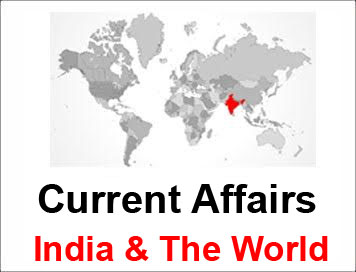(Current Affairs) India and The World | January: 2017

India & The World
- New Bill could pave for India’s entry into NS G (Free Available)
- US increased sanctions on LeT (Free Available)
- Nepal is not open to India's open sky offer (Free Available)
- Hong Kong altered its visa agreement with India (Free Available)
- India and Kyrgyzstan plans to act against terror (Only for Online Coaching Members)
- China raises objections over Dalai Lama invite (Only for Online Coaching Members)
New Bill could pave for India’s entry into NS G
- A new draft proposal circulated among NSG member-states early this month could pave the way for India to become a member of the elite club, but this is unlikely to happen before the end of the Obama presidency next month.
- The American push for India to become a full-fledged NSG member would now have to be pursued by the incoming Trump administration.
- The outgoing Obama administration is unlikely to fulfil its promise made to the Modi government before its term expires on January 20.
- A draft formula for NSG membership to countries like India and Pakistan, that are not a signatory to the Nuclear non-Proliferation Treaty (NPT), was submitted by Rafael Mariano Grossi, the former NSG Chair, who prepared the report on behalf of South Korea, the current NSG chair.
US increased sanctions on LeT
- Tightening the noose around Lashkar-e-Taiba, the U.S. designated the terror group’s student wing Al-Muhammadia Students a terrorist organisation and slapped sanctions against its two top leaders.
- LeT was designated as a terrorist organisation by the United States in December 2001.
- Since the original designation occurred, LeT has repeatedly changed its name and created front organisations in an effort to avoid sanctions, said the State Department.
- Simultaneously, the U.S. Treasury Department designated two LeT senior leaders, Muhammad Sarwar and Shahid Mahmood, as global terrorists. Both the LeT leaders are based in Pakistan.
Nepal is not open to India's open sky offer
- Nepal has rejected India’s ‘open sky’ offer to allow unlimited flights between the two countries.
- Nepal said it was not yet ready for the agreement. India has been keen on countering Nepal’s recent engagement with China on the road, railways and port connectivity.
- Airlines from India and Nepal are now allowed to operate 30,000 seats from each side.
- India and Nepal signed a memorandum of understanding to set up a joint technical committee to examine Nepal’s request for developing new air routes and air entry points at Janakpur, Bhairahawa and Nepalgunj.
- India signed an agreement with Sri Lanka, Jamaica, Guyana, Czech Republic, Finland and Spain to allow airlines to operate unlimited flights to Delhi, Mumbai, Kolkata, Chennai, Hyderabad and Bengaluru.
- Nepal has long been pushing for new airspaces to ease congestion on the existing routes and to save time and cost for air passengers.
Hong Kong altered its visa agreement with India
- Overstaying Indian nationals violating visa norms prompted Hong Kong, a China-administered territory, to alter its visa agreement with India.
- Hong Kong, which used to be part of a block of countries that gave Indians unconditional visa-free entry, has introduced “pre-registration” for Indian nationals to prevent illegal immigration.
- Under the previous visa agreement, Indian visitors could visit the Hong Kong Special Administrative Region for 14 days. However, the region had complained about abuse of the agreement by illegal immigrants from India.
- Indian nationals must apply for, and success-fully complete, pre-arrival registration online before they can visit or transit the HKSAR visa-free.
- It clarified that such registration would not be necessary for those transiting through the Hong Kong airport without leaving the airport transit area. The arrangement will be introduced on January 23.
- Hong Kong's unilateral decision came a year after its government sent a delegation headed by the AssistantDirector of Immigration from the Immigration Department and the Hong Kong Police in December 2015.

